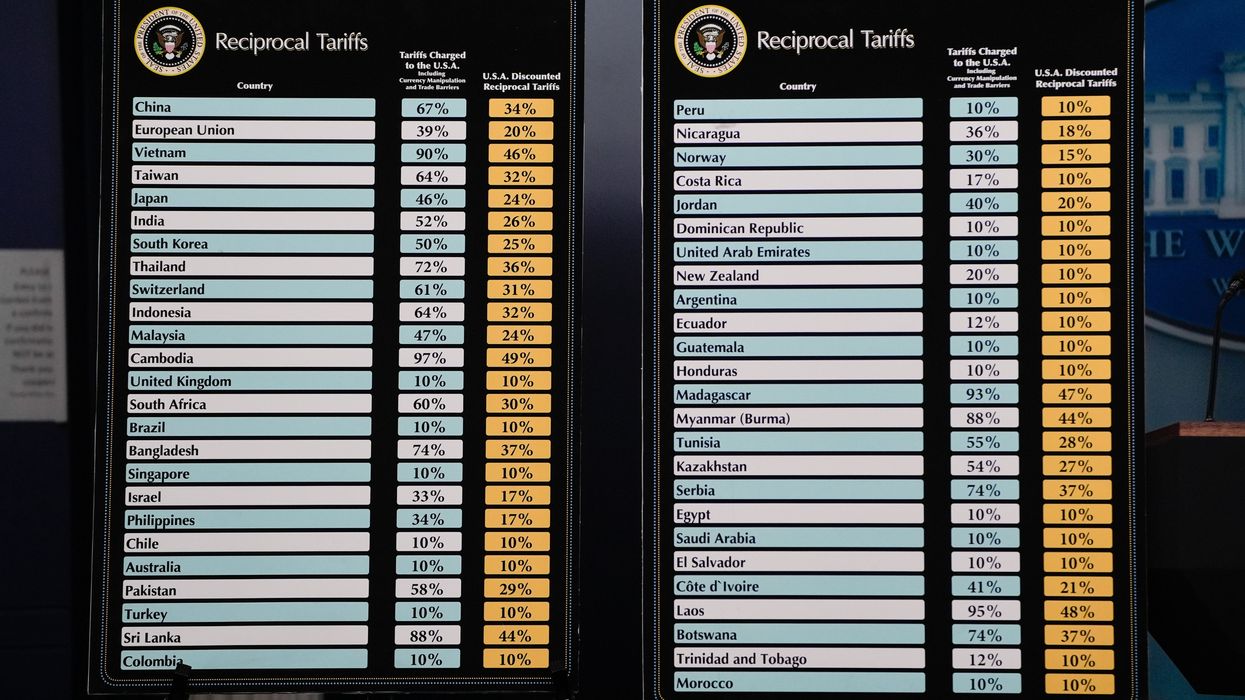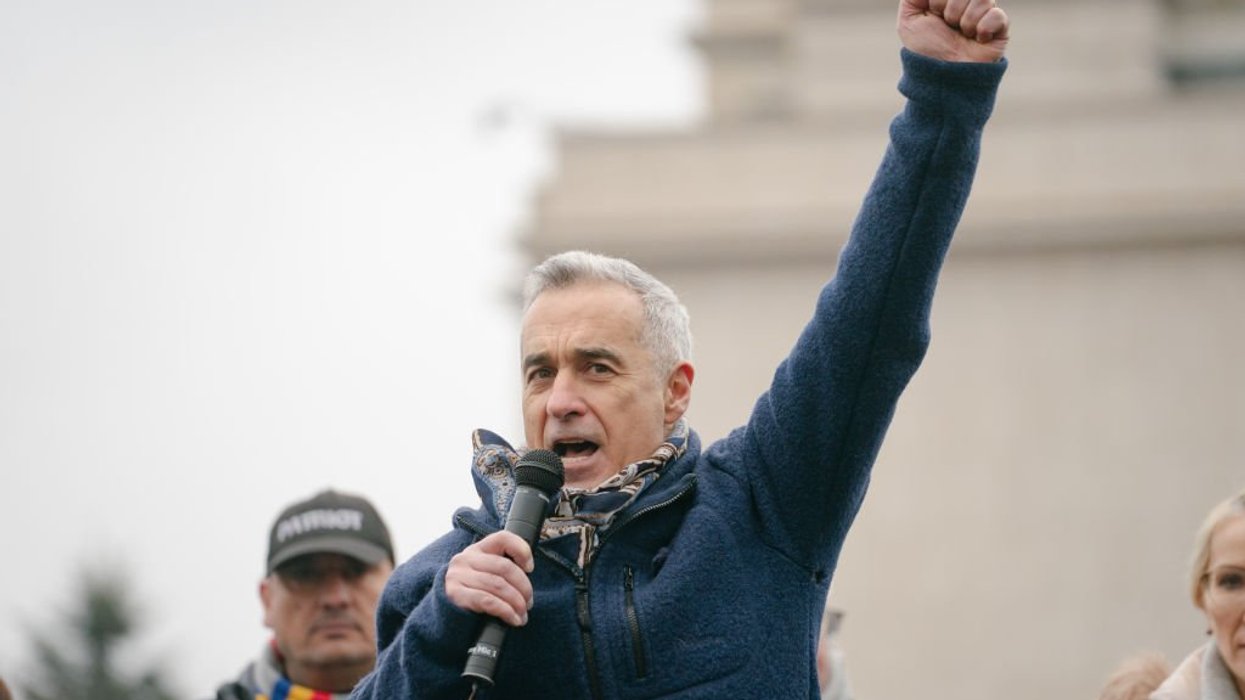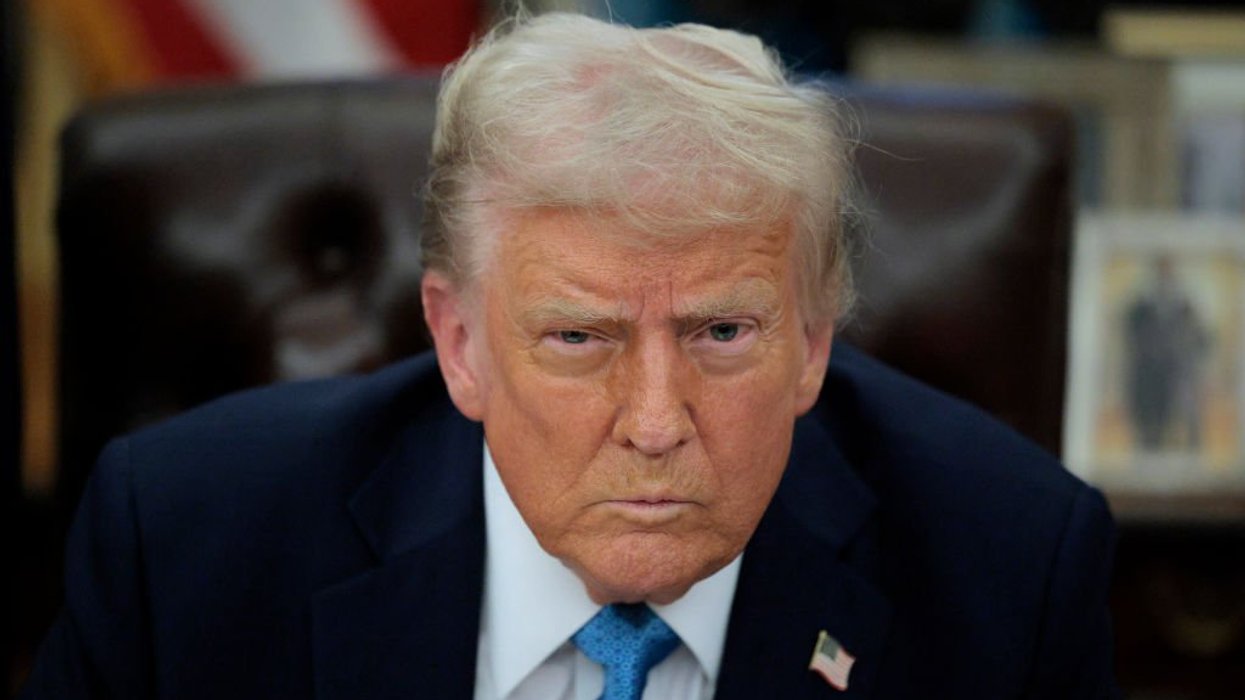GLENN: We've said it before. We'll say it again. The best governor I have ever had in my life, and I've lived all over the country. There's been no governor that I think is as good as Greg Abbott. And, yeah, you can throw up Sam Houston. Whatever. Meet Greg Abbott, the governor of Texas.
Greg, how are you, sir?
GREG: Doing good. I'm perplexed. I didn't know you knew Sam Houston.
GLENN: I didn't. But we're doing the history of Texas on radio in a few weeks. So we've been doing a lot of research on him. And I don't think he had anything on you.
PAT: He was pretty awesome though.
GLENN: He was pretty awesome. But you are -- you've assembled a great team around you, and Texas is in good hands.
GREG: Texas in great shape.
Before we get going, let me follow up on that last caller. Today is Valentine's Day. Let me give a shout-out. Happy Valentine's Day to my wife. It was on this day 30 years ago she and I got engaged.
GLENN: How did you do it?
PAT: Nice. What a romantic.
GREG: Did it on the River Walk in San Antonio, Texas.
STU: That's really smart. And you combined two present opportunities, so you don't have to do it twice. You've got the engagement and Valentine's Day. You can just combine -- that's efficiency. That's how he's running the state, efficiently.
GLENN: Efficiently. Really smart. So, Greg, we want to talk to --
GREG: She and I also have the same birthday. So that takes care of that also.
STU: Nice.
GLENN: Holy cow.
We wanted to talk to you about a couple of things. Let's start with the most pressing. And that is the bathroom situation with the NFL, where they say that if we don't correct our bathroom situation, we'll never get another Super Bowl.
GREG: The NFL is walking on thin ice right here. The NFL needs to concentrate on playing football and get the heck out of politics.
PAT: That's for sure.
GREG: Let's go back, first of all, to their last previous political statement they made, which is allowing NFL football players to kneel during the national anthem. These are people, especially with the quarterback for then San Francisco, taking a knee when the national anthem is being played. He's getting paid $100 million to play a game, complaining that he is oppressed. He needs to be standing up in respect for the men and women who died fighting in the United States military so he had the freedom to go out and play a game and get paid $100 million.
I got to tell you, I cannot name or even count the number of Texans who told me that they were not watching the NFL. They were protesting the NFL this year because of the gross political statement allowed to be made by the NFL by allowing these players who are not oppressed, who are now almost like snowflake little politicians themselves, unable to take the United States national anthem even being played. And now, most recently, for some low-level NFL adviser, to come out and say they are going to micromanage and try to dictate to the state of Texas what types of policies we're going to pass in our state, that's unacceptable.
We don't care what the NFL thinks. And certainly what their political policies are. Because they are not a political arm of the state of Texas or the United States of America. They need to learn their place in the United States, which is to govern football, not politics.
GLENN: But tell us how you really feel.
The amazing thing is --
GREG: It's a family show, so I've toned it down a little.
GLENN: I know. I was watching the Super Bowl. And if you look at the way they image themselves as all about fathers and sons and the rah-rah America and the troops and everything else -- they know who their audience is. Their audience is middle America. And yet it seems as though they're on this suicidal bent as a corporation.
GREG: For one -- listen, there's something easier here. And that is, if the NFL -- this is a heartfelt policy of theirs, if they really want to do something about, then they can install all these special bathrooms that they want that live up to their policy, as opposed to trying to dictate to states what types of policies they have. You know me, Glenn, I sued the federal government 31 times because I thought the federal government, a governmental body, by the way, was wrongly trying to tell Texas what to do.
Who is the NFL thinking they can tell Texas what to do politically?
GLENN: Let's switch gears. We have so much to talk to you about. Let me switch to sanctuary cities.
The Dallas -- what is it, the Dallas commissioner -- Dallas County courts or something came out.
JEFFY: Dallas County.
GLENN: And said they support the -- the sanctuary cities. We had the mayor of Irving on yesterday. She was outraged by it.
What's going to happen to sanctuary cities in Texas?
GREG: First, we need to understand that these are people -- unlike the NFL, these are people in Dallas County -- same thing happened in Travis County. For your listeners, Travis County is the county seat for Austin, Texas, which is a very liberal bastion.
GLENN: Uh-huh.
GREG: These are people who take an oath of office to uphold the Constitution and laws of the United States, as well as the state of Texas. And they are violating their oath of office by refusing to follow federal immigration law that dictates two local officials, two state officials, that they must cooperate with ICE and the immigration services. And if they fail to do so, they're in violation of federal law.
And so it is abhorrent that we have local officials saying that they are not going to apply the law.
Listen, they don't have the ability to pick and choose which laws they will apply. And hence, I believe that it should be a criminal penalty. I believe that they should be defunded. I believe that they should be fined for this conduct.
Now, Glenn, I've already started this process. Because when the Travis County sheriff announced a sanctuary city policy by refusing to comply with immigration services, by refusing to provide them information about who they were holding, these dangerous criminals behind bars, I as the governor of Texas, defunded governor grants to Travis County, to the tune of more than $1.5 million. If this in Dallas turns out to be more than talk and turns out to be action, I will defund them also from the governor's grants, which will add up to -- I haven't seen the amount. But I would assume it's going to be more than Travis County. It should be more than millions of dollars.
But we already -- I called sanctuary city policies, an emergency out in Texas. And the Texas senate has already passed out my bill out of their chamber. And what does is exactly what I said, is it imposes criminal penalties. It imposes fines to the tune of 25,000 a day, every single day a violation is taking place, as well as defunding the sheriff's offices or any other offices from any funds that they receive from the state of Texas.
And so we are going to bring the hammer down on anyone who thinks they can impose a sanctuary city policy.
Now, let's tie this back to football. This last fall, there was a man who was leaving a Dallas Cowboy game, going back home. He stopped in Cedar Hill, which you may know -- your listeners may know. It's a suburb of Dallas. And he stopped at a gas station there. And he was brutally murdered by an illegal immigrant who went on a crime spree. This illegal immigrant had been arrested multiple times. Deported three times. Was back into the state illegally. And we have to send a message that we are not a welcoming state for these repeat violators, these people who have been repeatedly deported, these people who now turn into mass murderers because this guy -- the murderer, Juan Rios, not only killed this man in Dallas County, but killed someone else and went on a crime spree across the entire state of Texas before he was arrested. We don't want any Kate Steinles in the state of Texas. And we are going to make sure that our law enforcement officials are going to follow and apply existing immigration law. And if they fail to do so, there will be heavy consequences to be paid.
GLENN: We're talking to America's governor, Governor Greg Abbott, from the great state of Texas.
Governor, you know and I know that the vast majority of Democrats may disagree with us on things. But they're not radicals. They're not -- they don't want to see the end of the country or anything like that. But there are radicals, on both sides, that do want chaos.
And if -- just play this out for me. If -- if we defund the -- the cities, and there are those radicals that want that to happen, and crime starts to rear its ugly head and things start to get bad, Donald Trump has already said he'll send in federal troops. We don't want federal troops in our cities.
How do you balance this? How do you make sure that the cities are -- are running and the people are safe?
GREG: Well, it goes back to the -- if you would, the tax structure of the state of Texas. We won't fully defund the cities. A lot of their funding -- really, the majority of their funding comes from local and property taxes as well as sales taxes. So it's not going to defund their operations. What it will do is it will put such heavy financial consequences on them that one of two things will happen, either one, they will go ahead and say, "Listen, the penalty is too much. I'm going to overturn our sanctuary city policies." Or two, the local citizens are going to be fed up with the irresponsibility, lawlessness, of these local officials, and they will kick them out of office. But a third is, because of the criminal penalties, we will put these noncompliant sheriffs behind bars. They will lose their job, and they will be followed up by somebody who will apply the law. If they don't apply the law, we will put them behind bars also.
So, in other words, we can continue going through the turnstile of sheriffs who refuse to comply with the law, until we find one who does comply with the law. And at that point in time, they will be in compliance. They won't be losing any money.
GLENN: All right. Let's go to -- let's go to something that I feel strongly about. And I'm afraid that there are a lot of Republicans now that have Donald Trump in office, they will say, "Oh, things aren't so bad. We don't really need this."
And that is the Convention of States. In your state of the state speech, you spent a good deal of time talking about the Convention of States and why we need this.
Are we going to -- are we going to be added to the list? Are we going to be a state that is involved in the Convention of States?
GREG: There is such a strong movement in the state of Texas right now. I began talking about this when I wrote a book on it and started touring around the state of Texas talking about it. And there are well over 100,000 -- I'm told, hundreds of thousands of activists. Not just people who have supported -- but people who have actively engaged in the political process, who are taking the capital by storm. Educating the members of the House and Senate, that it needs to be done.
Remember this, and that is last session we had here in the state of Texas, the Texas House of Representatives did adopt the Convention of States platform. We -- at that time, we were only a vote or two short in the Texas senate. I think we will have enough votes in both the House and the Senate to finally get this done and make Texas a leader in this process of the Convention of States.
Let me follow up as kind of a comment you were suggesting about Trump. And that is, remember this, for your audience, the problem that we are in now nationally is not a problem caused by one president alone. Yes, Barack Obama did more than his share to depart from the Constitution. But this is something that's been going on for almost a century now.
It goes back well before FDR who was one of the leaders of getting away from the Constitution.
But it goes back into the 1800s. So it's been a process of erosion. Just the way you would see a river erode over time. Our Constitution has been eroded over time. So this wasn't a problem caused by one president. It cannot be fixed by one president. Simply because Donald Trump is in there, doesn't mean our constitutional flaws are going to be fixed.
Let me give you the most easiest example. And that is, I know you and many of your listeners will know the Tenth Amendment. We want a Tenth Amendment to be upheld. And that is that all powers not delegated to the federal government and the Constitution are reserved to the state and sort of the people. Well, there's a problem in the way that provision is written. It doesn't specifically say who gets to enforce the Tenth Amendment. All we want to do is to add a clause or a sentence that says, "States have the power to enforce the Tenth Amendment." That's easy. That's common sense. That's something we can get 38 states, which is three-fourths of the states to agree upon. And it restores power to the states to enforce the Tenth Amendment.
STU: Hmm.
GLENN: We would like to have you back on. I know you have to go because you're a governor I guess of an important state. But we'd love to have you on again. Because there are just so many things that need addressing. And you distill them so well. Texas Governor Greg Abbott, we appreciate your time, sir. Thank you so much.
GREG: My pleasure. Thank you, Glenn.
GLENN: You bet. You know, it's interesting to me. And I wish we had time to talk to him about what's happening in California. California, remember, they all made fun of us for saying we wanted to secede. Texas wanted to secede. And now, Slate and Atlantic and all these left magazines are all saying --
PAT: That's not so outrageous. That's not so bad.
JEFFY: Why it makes sense for California to leave.
PAT: Yeah.
GLENN: No. What makes sense is the Convention of States so you as a state are not being held with a gun to your head, depending on who is elected.
We've got to stop this, now. Because I've got news for you. Trump can reverse all this stuff. You think the other guy is not going to come in and reverse all this stuff when they get in, of course.
PAT: And how about a constitutional amendment to take away some of that power.
GLENN: Yes.
PAT: Take that power away from some of these people. And just term limit them.
STU: Yes.












